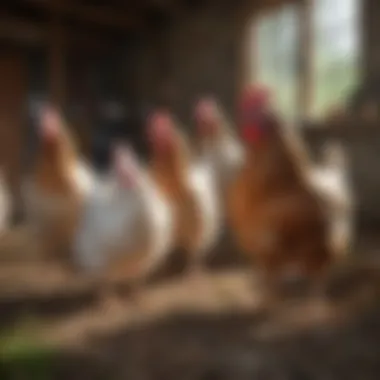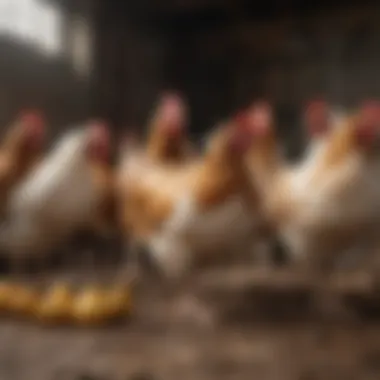Where to Buy Laying Hens Near Me: A Comprehensive Guide


Intro
Purchasing laying hens can be a rewarding endeavor for those interested in sustainable living and local food production. It requires a clear understanding of various purchasing sources, consideration of specific breeds, and insight into the welfare and health of the hens. This article aims to provide prospective buyers with essential information about where to find laying hens nearby and the elements to consider during the buying process.
The decision to raise hens is not merely about acquiring eggs. It also involves ongoing responsibility for their care and wellbeing. Therefore, knowledge about local suppliers, online options, and important factors regarding hens' welfare and pricing is crucial. By being informed, buyers can make better choices that benefit both themselves and the animals they aim to support.
Local Suppliers
When searching for laying hens, local suppliers are often the first stop. These sources may include farm stores, agricultural fairs, and local farms. Engaging with local suppliers offers several benefits:
- Fresh and Healthy Stock: Local farmers often have hens raised in proper conditions, ensuring their health.
- Face-to-Face Interaction: Buyers can ask direct questions about the hens' upbringing and care instructions.
- Variety of Breeds: Many local suppliers feature diverse breeds that cater to specific egg production needs.
However, it is essential to visit these suppliers in person. Observe the environment in which the hens are kept to assess their welfare standards. Check if the supplier is reputable and well-reviewed within the community.
Online Resources
In the digital age, online options for purchasing hens are increasingly popular. Websites and platforms dedicated to livestock sales can provide a wealth of information and convenience.
- Reputable Websites: Sites like My Pet Chicken and Cackle Hatchery offer a variety of breeds and delivery options.
- Local Classifieds: Platforms like Craigslist can be valuable for finding nearby sellers.
- Social Media Groups: Joining Facebook groups focused on poultry farming can connect potential buyers with responsible breeders.
While online purchasing offers convenience, buyers should exercise caution. Verify seller reviews and ensure proper animal shipping practices to prevent stress to the hens.
Breed Selection
Selecting the right breed of laying hens is critical. Different breeds produce varying quantities and sizes of eggs, and some are better suited to specific climates or living conditions. Here are a few popular laying hen breeds to consider:
- Leghorn: Known for high egg production and hardy constitution.
- Rhode Island Red: Resilient and excellent foragers, ideal for backyard settings.
- Plymouth Rock : Friendly and good layers, fitting for those looking for companionship.
Before making a choice, evaluate factors such as egg color preferences, growth size, and temperament, which can significantly influence your everyday experience with the hens.
Welfare Standards
Ensuring a high standard of welfare is paramount when purchasing laying hens. Investigate the practices of suppliers regarding their hens’ care:
- Living Environment: Hens should have access to clean, spacious, and safe environments.
- Social Interaction: Chickens are social animals and should be kept in flocks.
- Health Practices: Suppliers must handle vaccinations and regular health check-ups adequately.
As consumers, insist on transparency regarding these welfare practices. This will not only safeguard your investment but also contribute positively to animal rights activism.
Finale
Having the right information about where to buy laying hens and understanding key factors such as breed and welfare is foundational. By exploring local suppliers and online resources, potential buyers can find suitable laying hens that fit their needs. Ultimately, well-informed choices will lead to a fruitful and ethical endeavor in poultry keeping.
Understanding Laying Hens
Understanding laying hens is a crucial aspect for anyone interested in poultry, especially for pet owners and animal lovers who wish to maintain a small flock at home. This section explores the specifics of these birds and the importance of understanding their characteristics, behaviors, and needs.
Characteristics of Laying Hens
Laying hens are distinct from other breeds of chickens primarily due to their purpose. These hens are specifically bred to produce eggs. Key characteristics include:
- Egg Production: The most notable characteristic of laying hens is their ability to lay eggs consistently. Depending on the breed, they can yield anywhere from 200 to 300 eggs annually.
- Physical Traits: Laying hens often have a smaller body size compared to broilers, their feathers may vary in color, and the shape of their comb can differ among breeds.
- Temperament: Typically, laying hens are friendly and can be relatively calm. This temperament makes them suitable for families and individuals who may interact with them regularly.


Another important feature is their reproductive cycle. Laying hens often begin laying eggs around 5 to 6 months of age, continuing to do so for about 2 to 3 years before their production declines. Understanding these characteristics aids in making informed decisions when purchasing hens.
Benefits of Raising Laying Hens
Raising laying hens comes with numerous benefits which extend beyond just egg production. These benefits include:
- Fresh Eggs: One of the most tangible advantages is access to fresh, organic eggs. These can taste better compared to store-bought equivalents, and knowing the quality of feed enhances their nutritional value.
- Sustainable Living: Owning laying hens contributes to a sustainable lifestyle. You can recycle kitchen scraps, reducing waste while providing a natural food source for your chickens.
- Companionship: Hens can be quite social animals. Many owners find joy in interacting with their flock, and hens can exhibit personalities that contribute to a homely atmosphere.
"One of the most significant benefits of raising laying hens is the relationship one builds with these intelligent creatures as they become an integral part of daily life."
- Education for Children: Keeping hens can be an educational experience for children, teaching them about responsibility, nature, and the importance of caring for living beings.
- Pest Control: Hens naturally forage and can help reduce pests in the backyard, making them beneficial for garden maintenance.
In summary, understanding laying hens is essential for anyone considering them. Their characteristics dictate how they are cared for and managed, while the benefits provide motivation for raising them.
Local Sources for Purchasing Laying Hens
When considering where to buy laying hens, local sources merit discussions due to their accessibility and potential to support community businesses. Engaging with nearby providers often offers insights that online sources cannot. The familiarity with breeds, local climate considerations, as well as immediate access to healthy birds, all factor in. Additionally, local sourcing cultivates a sense of community. Establishing relationships with local farmers and hatcheries can enhance the experience of raising chickens.
Farmers Markets
Farmers markets present a wonderful opportunity for purchasing laying hens. These markets often feature vendors who specialize in poultry, providing an environment where buyers can interact directly with sellers. Not only do these interactions facilitate a more personal approach to buying, but they also allow prospective owners to inquire about the specific breeds available and their care needs.
Shopping at farmers markets ensures that the hens are often raised locally and are therefore more accustomed to the regional environment. This can be a benefit, as hens conditioned to local weather and conditions may adapt more easily in their new homes. Furthermore, buyers gain first-hand knowledge of the farm's practices, enhancing trust regarding animal health and welfare.
Local Farms and Hatcheries
Local farms and hatcheries are central to acquiring laying hens. They mainly focus on breeding and raising chickens, often providing a wider selection of breeds compared to other sources. Established local farms may also have better insights into the specifics of each breed, including their egg production levels, temperament, and adaptability.
Purchasing hens directly from a nearby hatchery allows buyers to see the facilities where the birds are raised. This transparency can provide reassurance about the health and welfare of the birds. Moreover, many hatcheries offer chicks for those interested in starting with younger birds, which can have lower initial costs than older hens.
Agricultural Co-ops
Agricultural cooperatives play a vital role in the local agricultural ecosystem, including the supply of laying hens. They often provide members with collective purchasing power, which can result in lower prices for high-quality hens. Additionally, co-ops typically offer educational resources and networking opportunities for poultry owners.
Joining a co-op may also facilitate access to veterinary services, feed, and other supplies essential for raising laying hens. The sense of community is strong within these groups, allowing members to share knowledge and resources effectively.
Online Sources for Purchasing Laying Hens
Finding laying hens online has become an essential part of making an informed purchase. As the demand for backyard chicken rearing rises, many prospective owners turn to digital resources for both convenience and variety. Online sources provide access to a broad selection of breeds, which may not be available locally, enabling buyers to discover options that fit their specific needs.
Moreover, online purchasing allows buyers to compare prices and read reviews about different vendors. The importance of understanding the reputation of breeders cannot be overstated, as it plays a significant role in ensuring healthy and well-cared-for hens. Thus, using the internet as a tool to assist in your search for laying hens can be beneficial in many ways.
Reputable Breeders Websites
Reputable breeders often have websites that outline their practices and inventory. These sites typically provide detailed information on the various breeds of laying hens they offer, along with photographs and descriptions. You can expect to find sections devoted to their breeding standards and care protocols, which help establish trust with potential customers.
By visiting websites of established breeders, prospective owners gain insights into:
- Health information: Most reputable breeders will provide health guarantees or vaccinations that their hens have received.
- Breed details: Understanding the laying capacity, temperament, and adaptability of specific breeds helps in making sound decisions.
- Customer reviews: Positive reviews and testimonials enhance credibility, serving as a means for buyers to gauge other customers' experiences.
Online Marketplaces


Various online marketplaces have emerged as suitable platforms for purchasing laying hens. Websites like Craigslist and eBay have sections that allow individuals and small farms to list their chickens for sale. These platforms often see a mix of both professional and amateur sellers, which means there is potential for finding hens at competitive prices.
It's important to keep in mind that buying through online marketplaces does come with some risks:
- Quality assurance: Unlike dedicated breeders, individuals may not always provide health guarantees.
- Scams: Exercise caution and ensure that transactions are safe.
Buyers should look for sellers who have a good reputation, as well as detailed listings that include pictures and care information.
Social Media Groups
Social media groups are another valuable online resource for purchasing laying hens. Platforms such as Facebook host numerous groups dedicated to backyard poultry. Within these communities, members often share resources, insights, and even listings of hens for sale.
Some advantages of using social media groups include:
- Networking with other poultry owners: Reaching out to experienced owners can provide valuable advice and tips.
- Local seller connections: Often, group members are local, making it easy to arrange for pick-up or delivery.
- Real-time updates: Members frequently post about available hens, ensuring that you stay informed.
When engaging in any social media group to find hens, verify the credentials of the seller and learn from previous transactions by reading comments and feedback from other members.
"Utilizing online resources to purchase laying hens can enhance your selection process and ensure you find the right fit for your backyard coop. Always do thorough research!"
Considerations When Buying Laying Hens
The process of acquiring laying hens requires careful consideration. The choices one makes can significantly influence the productivity and welfare of the chickens. Understanding what to look for in laying hens can lead to better outcomes for both the flock and the owner. This section will explore essential factors that help ensure the purchase of healthy and productive hens.
Breed Selection
Choosing the right breed is fundamentally important. Different breeds have specific characteristics and requirements that can affect their egg production, temperament, and adaptability to the local environment. Popular laying hen breeds include the Leghorn, Rhode Island Red, and Australorp, each with unique traits. For instance, Leghorns are known for their high egg yield but may require more space due to their active nature.
Consider these aspects when selecting a breed:
- Egg production rates: Assess how many eggs a breed typically produces. Some breeds are known for laying more eggs annually.
- Egg size and color: This can be aesthetic for some owners. Choose according to personal preference.
- Temperament: If space is limited, consider a calmer breed to reduce stress.
Age of Hens
The age of the hens also plays a critical role in their productivity. Younger hens, usually around 16 to 24 weeks, will start laying eggs shortly after maturity. Older hens, especially those over two years, tend to lay fewer eggs. Buying hens at the right age is essential:
- Pullets: These are young hens that have not yet begun to lay. They provide long-term productivity but may need more care initially.
- Adult hens: These will start producing eggs right away but may plateau in productivity over time.
It might be tempting to opt for younger hens, especially for those starting a new flock. However, understanding the growth cycle will assist in making an informed decision based on specific needs and goals.
Health and Welfare Standards
Ensuring the health and welfare of laying hens is paramount. When purchasing hens, assess the quality of care they receive before the sale. Check for:
- Visible signs of health: Look for bright eyes, clean feathers, and good body condition. These signs indicate proper care.
- Living conditions: Inquire about the environment the hens were kept in. Good hygiene and space are vital for their health.
- Vaccination records: Verify any vaccinations they have received. Disease prevention is crucial for flock health.
Animal welfare leads to better egg production and quality. When hens are kept in favorable conditions, they tend to be less stressed and healthier:
"Healthy hens produce better quality eggs and are less prone to disease."
In summary, careful attention to breed selection, age, and health standards will enhance your experience when buying laying hens. These factors contribute to a successful venture into raising backyard poultry, ensuring both the hens and possessors can thrive.
Cost and Investment in Laying Hens


When evaluating the journey of raising laying hens, understanding the financial aspects becomes pivotal. The costs involved can significantly influence not just the initial purchase but the ongoing investment needed for the welfare of these birds. This section outlines crucial elements, benefits, and considerations regarding the financial commitment required to successfully keep laying hens.
Understanding Pricing Factors
The price of laying hens can fluctuate based on several factors. Firstly, the breed plays an essential role. Certain breeds such as the Rhode Island Red or the Leghorn might have differing price points due to their popularity and egg-laying efficiency.
Another pricing factor is the age of the hen. Pullets, which are young hens yet to lay eggs, often come at a higher initial cost compared to older hens that may be close to the end of their productive years. Additionally, the seasonality of supply can affect pricing. During peak seasons for poultry farming, prices might drop, while during off-seasons, they can increase.
Moreover, the purchase location also influences cost. Farmers markets may offer competitive pricing, while online breeders might have added shipping fees. When considering buying from hatcheries or local farms, the costs could reflect their operational expenses and quality standards.
Expense Considerations for Chicken Care
Purchasing laying hens is just the beginning. Continuous investment in their care is vital for health and productivity. Here are key expenses to consider:
- Housing Costs: Proper shelter is critical. Building a coop requires materials like wood, nails, and roofing. Depending on size, this expense can vary greatly.
- Feed Expenses: A balanced diet is necessary for optimal egg production. Quality layer feed might cost from a few dollars to over twenty per bag, depending on brand and quantity.
- Healthcare Costs: Regular veterinary check-ups and vaccinations can add up. It's essential to factor these into your budget for proper hen wellness.
- Bedding and Maintenance: Keeping the coop clean is essential for hygiene. Straw or wood shavings are common bedding materials, and their costs should be accounted for regularly.
"Understanding the full spectrum of costs associated with raising hens can help avoid unexpected financial burdens later on."
Planning a budget that covers both initial investment and ongoing costs can lead to a more sustainable and enjoyable experience in keeping laying hens. By preparing financially, owners position themselves better for success in their poultry endeavors.
Preparing for Your Laying Hens
Purchasing laying hens is only the start of your journey. Preparing for their arrival is crucial to ensuring the health and productivity of your flock. This preparation affects not only the well-being of the hens but also your experience as an owner. Understanding the specific needs for housing, environment, and feeding is essential. These elements will directly influence how well the hens adapt to their new home and how effectively they will lay eggs in the long run.
Housing and Environment Needs
Providing appropriate housing is an essential first step in preparing for your laying hens. A well-constructed coop offers protection from predators and extreme weather. The coop should be secure and spacious enough for the number of hens you have. Generally, allocate around four square feet per hen inside the coop, and at least ten square feet per hen in an outdoor run. Ventilation is crucial. Cross-ventilation helps prevent heat buildup and maintains air quality.
Furthermore, consider elevation to avoid damp ground, which can lead to disease. The floor should ideally be covered with straw or wood shavings, allowing for easy cleaning and odor control. Additionally, hens enjoy perches. These should be provided at least two feet off the ground. This setup will ensure they are comfortable and happy in their surroundings.
Feeding Requirements
Nutrition is another significant factor when preparing for laying hens. A well-balanced diet will lead to healthy hens that produce quality eggs. Hens typically require a diet that consists of layer feed containing at least 16% protein when they start laying, supplemented with calcium sources such as crushed oyster shells to support eggshell quality.
In addition to feed, always provide fresh water. Hens need to stay hydrated for optimal health. Offering scraps from the kitchen can enrich their diet with additional nutrients; however, avoid feeding them processed foods or anything toxic such as chocolate or avocado. Varied diet will lead to healthier and happier hens.
"A well-prepared environment supports the health and productivity of your flock."
Legal Considerations for Keeping Laying Hens
Understanding the legal considerations for keeping laying hens is essential for anyone looking to add these birds to their household. Ensuring compliance with local laws safeguards not only the welfare of the hens but also the harmony within the community. Regulating factors may vary widely depending on the region, making it crucial to familiarize oneself with specific local rules.
Legal frameworks regarding poultry often focus on zoning laws and necessary permits. These rules help manage issues related to animal welfare, noise, and environmental impact. Failure to comply can result in fines or forced relocation of the hens. Therefore, prospective chicken owners must conduct thorough research on their local regulations before acquiring any birds.
Zoning Laws and Regulations
Zoning laws dictate what is permissible in specific areas, affecting where laying hens can be kept. Many urban and suburban regions have specific zoning designations that may restrict or prohibit livestock, including chickens.
- Check Local Ordinances: Always start by reviewing the municipal and county ordinances. Some cities have embraced the idea of urban farming and allow keeping a certain number of chickens without a permit, while others might have stricter rules.
- Setback Requirements: Many jurisdictions require a specific distance from neighbors' properties. Understand these setbacks to avoid potential conflicts and ensure the happiness of inhabitants.
- Type of Housing: Zoning may also dictate the kind of structures allowed for keeping hens, whether it's a simple coop or a more elaborate setup.
- Noise and Care Regulations: Local laws might also cover noise control and daily care standards, as roosters—though often not kept in layer flocks—can generate complaints.
Permits and Licensing Requirements
In addition to zoning laws, certain areas may require specific permits or licenses to maintain laying hens legally.
- Research Permit Needs: Each jurisdiction differs in this aspect. Some may not require any permit, while others mandate an application process to keep chickens. Knowing the requirements well can save time and legal trouble.
- Animal Welfare Standards: When obtaining a permit, residents often must meet animal welfare guidelines set by local authorities. This includes ensuring proper housing, nutrition, and healthcare for the hens.
- Regular Inspections: Some permits may involve regular inspections of the coop and grounds to ensure compliance with health standards. Be prepared for this to maintain poultry and public health safety.
Important: Failing to secure the necessary permits can result in removal of hens and possible penalties. Always remain informed and proactive regarding local policies.
Navgating the regulatory terrain can seem daunting, but understanding local laws is an important step for successful hen-keeping. Ignoring these legal aspects can lead to unnecessary headaches, compounding on the basic joys of keeping laying hens at home.







